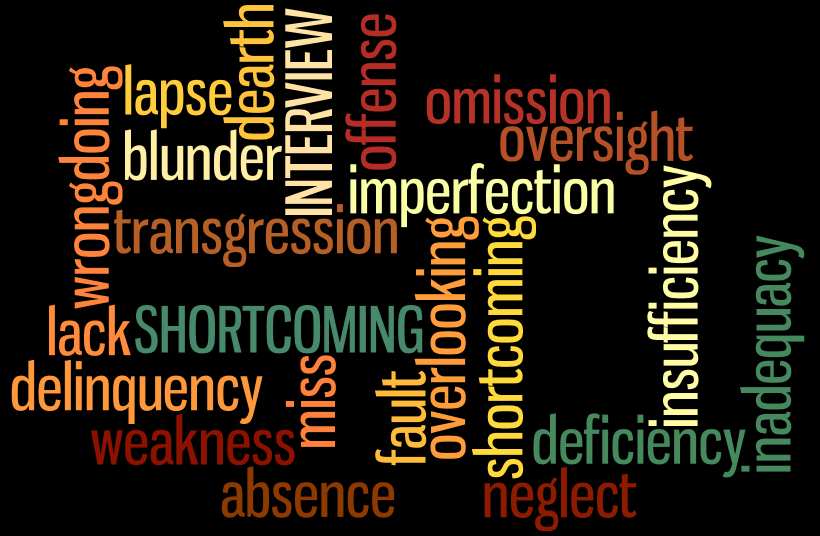 A shortcoming is an imperfection or a failure to meet a certain standard.
A shortcoming is an imperfection or a failure to meet a certain standard.
When applying for a job, it is very unlikely that the candidate would meet all the requirements and expectations in terms of skills or experience. Almost all applicants for a certain job will have some degree of shortcoming varying from lack of experience, education, previous terminations or frequent job hopping.
There is a large possibility that the employer might need clarification on certain shortcomings at your next interview. The better prepared you are to answer such questions tactfully and honestly the better the chances of being hired.
The key is preparedness. As you read these tips, be prepared to write down what you would say pertaining to your situation – stay honest to your experiences.
Now say it out loud – for confidence. Confidence is directly linked to sincerity. Addressing your shortcomings is not adding a twist to honest stories, link them the right way to reinforce value and clarity to your explanation. And since this is not an easy task, the emphasis is on preparedness.
Here are 4 common shortcomings and some tips on how to address these at your next interview:
Lack of Experience
You may lack experience in the area you are applying for the job, the point is to focus on what you bring to the table than what you don’t. Use stories of previous experiences and accomplishments in other areas to leverage on your career achievements and strengths. Write down a few success stories from your previous job, charity work or volunteering experience. Now relate how these stories or results can be applicable to this position.
If you can point out some references who can offer evidence of your quality work, the employer might as well hire a trusted efficient candidate who’s low on experience as compared to one with the required one but not much to look back on ethics and reliability.
When asked that your experience doesn’t exactly match our job requirements; Dummies.com suggests:
“Don’t agree. Instead, say that you see your fit with the job through a rosier lens. Your skills are cross-functional. Speak the language of transferable skills and focus on how you can easily transfer your experience in other areas to learning this new job.”
Frequent Job Changes
Changing careers and jobs was perhaps your idea to find the ideal one that is best suited to your interest. Often, our education directs our first job or placement but it is through experience that we get to explore our real passion or repath based on new acquired skills. How can you weave a story on your past experience and how each experience has led you to a better opportunity? Perhaps, it is not a lack of decision that led you on the job hopping path but the explorer within you who has always wanted to find better pastures for intellectual growth.
Whatever be your explanation, make sure that it ties in closely with your previous jobs / work experience listed on your resume.
Lack of a Degree
Your achievements at school, organization skills, stories on how you mastered a particular subject, or helped around with a school fundraiser can be helpful. Any certificate courses or retraining efforts also count. Most of us usually underestimate our abilities and would rather underplay them than toot our horns. And don’t expect that the stories will come to you magically when you are at the interview; again – the emphasis is on preparedness. Writing down such stories now will help in better recollection during the interview.
Previous Termination(s)
Maybe it was you or maybe it was them. The point is to present this scenario in a positive light without any finger pointing to your previous boss or the company’s management style. Dick Bolles, author of What Color is Your Parachute recommends volunteering that you were fired even before the question is asked.
An unfair termination can also be justified but try not to be on the defensive. A statement or two may be enough for an explanation but lingering on long at this topic is not suggested.
To explain how you lost your last job without it keeping you from getting the next one the key is to:
- Discuss what happened
- Talk about what you learned
- Explain why it won’t ever happen again
Tips:
- Whenever possible turn the focus on your enthusiasm for the job and highlight your positive attitude through your answers.
- End your explanations with a question. It offers an instant redirect from further probe and you can control the situation if you wish not to talk about it any further.

